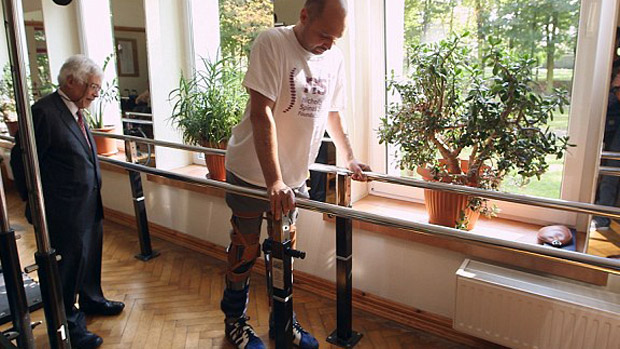Paralysed man walks again after 'historic' cell transplant
Darek Fidyka's recovery described as 'more impressive than man walking on the Moon'

A free daily email with the biggest news stories of the day – and the best features from TheWeek.com
You are now subscribed
Your newsletter sign-up was successful
A fireman left paralysed in a stabbing attack has learnt to walk again after undergoing pioneering surgery using cells from his nose.
Darek Fidyka, who is believed to be the first person in the world to recover from a completely severed spinal cord, said the experience of walking again was like being reborn.
"It's an incredible feeling, difficult to describe," said the 40-year-old. "You're at a certain moment in your life when you think it will never happen again and yet... it's possible."
The Week
Escape your echo chamber. Get the facts behind the news, plus analysis from multiple perspectives.

Sign up for The Week's Free Newsletters
From our morning news briefing to a weekly Good News Newsletter, get the best of The Week delivered directly to your inbox.
From our morning news briefing to a weekly Good News Newsletter, get the best of The Week delivered directly to your inbox.
About 1,000 people suffer a spinal cord injury each year in the UK and Ireland, and about 50,000 people are living with paralysis, says The Times. Patients with incomplete spinal injuries often recover, but until now complete spinal cord injuries have been broadly regarded as permanent and incurable.
Fidyka, who was paralysed from wounds inflicted by his partner's ex-husband in July 2010, can now walk with a frame and even drive a car.
"Spinal cord injury is quite easy to do and utterly devastating for the people who have it," said Geoffrey Raisman, of University College London, who pioneered the technique. "This opens a door that was not open before. I think we're looking at something historic."
He described Fidyka's recovery as "more impressive than man walking on the Moon".
A free daily email with the biggest news stories of the day – and the best features from TheWeek.com
Scientists in Poland transplanted "olfactory ensheathing" cells (OECs) from his nose to his spine, enabling the ends of severed nerve fibres to grow and join together – a process that was previously believed to be impossible, says the Daily Mail.
Raisman compared the technique to motorists finding other routes around a closed section of motorway, adding: "What we're doing is repairing the motorway."
The research was funded by the UK Stem Cell Foundation and Nicholls Spinal Injury Foundation, founded by the British hotelier David Nicholls, whose son Daniel was paralysed in a swimming accident at the age of 18. Scientists are now planning to treat ten more paralysed patients in a carefully controlled clinical trial.